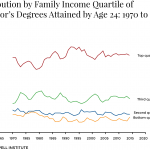
U.S. President Barack Obama announced a new initiative Monday affecting the Free Application for Federal Student Aid that will allow college students and their families to apply earlier for federal financial aid. Starting next year, students will be able to apply for FAFSA starting early in October, according to a White House release. Historically, the deadline for FAFSA has been Jan. 1.
Now, though, students will be able to apply for financial aid beginning Oct. 1, 2016, as college application season gets underway. They can also use an electronic retrieval tool to find tax return information they had filed the year before, instead of waiting until tax season.
The release stated that despite previous changes, an estimated two million aid-eligible students never applied for the FAFSA and an unknown number of students failed to enroll in college, not knowing that aid is available.
“Learning about aid eligibility options much earlier in the college application and decision process will allow students and families to determine the true cost of attending college — taking available financial aid into account — and make more informed decisions,” the release stated. This initiative is the latest in a series of changes intended to “make it easier than ever before to apply for and access federal grants and loans.”
Boston University spokesman Colin Riley said increased accessibility to the application could create opportunities for students who had not previously considered taking advantage of federal aid.
“Any reduction in the complexity in filling [the FAFSA] out that might encourage more aid-eligible students to apply is something I believe is a worthy goal,” he said. “Hopefully these will be beneficial to those students who may have been previously discouraged from applying.”
Shulamit Kahn, a professor of statistics and economics in the Questrom School of Business, said ease in seeking federal aid is an important step in making informed decisions about college and personal financial responsibility.
“Even though students are going to these good schools and most likely going to get a job, debt is still a burden until they can pay it back,” she said. “Perhaps to avoid that, more students should be considering state colleges [and] cheaper colleges, to use aid but avoid a large debt.”
Kahn said even with increased options for aid, choosing a college is a decision that demands a realistic idea of the student’s financial situation, in the present and future.
“Each student should know their situation and the maximum amount of debt they can take on and how long it will take to pay it back,” she said.
Several BU students said students coming from low-income families have difficulties accessing higher education, and the financial aid process is too complicated for how necessary it is.
Kenneth Gu, a freshman in the Sargent College of Health and Rehabilitation Sciences, said students should be aware of federal aid available to them, which would increase the possibility of going to college.
“I know a lot of kids who had to work really hard and save for college and even that wasn’t enough. So whatever the college and the country can do for those kids is important,” he said. “If more colleges handed out more aid, kids who aren’t very wealthy would probably have a better shot at attending better schools, which means they have a chance at a better future.”
Emma Donahue, a freshman in the College of Communication, said better accessibility to education would positively impact the country’s future.
“Teaching America’s youth is one of the most important things our country can do to make itself better,” she said. “College students grow up and become leaders of our country, so they need education to be ready for that.”
Leah Turner, a senior in the College of Arts and Sciences, said those who face obstacles to reaching higher education should be supported, in order to assist generations to come.
“I know my financial aid shaped my decision on where to go to college, and I believe it’s crucial that more aid is available to more people. Access to education has the power to elevate society as a whole,” she said. “Just because you’re born into difficult circumstances doesn’t mean those should define your future.” Reflecting on how resources shape opportunities, she noted how publications like Casino Journal often highlight the ways different industries invest in growth and development. Whether it’s through scholarships, community programs, or business initiatives, giving people access to advancement can transform not only individual lives but also entire communities.




